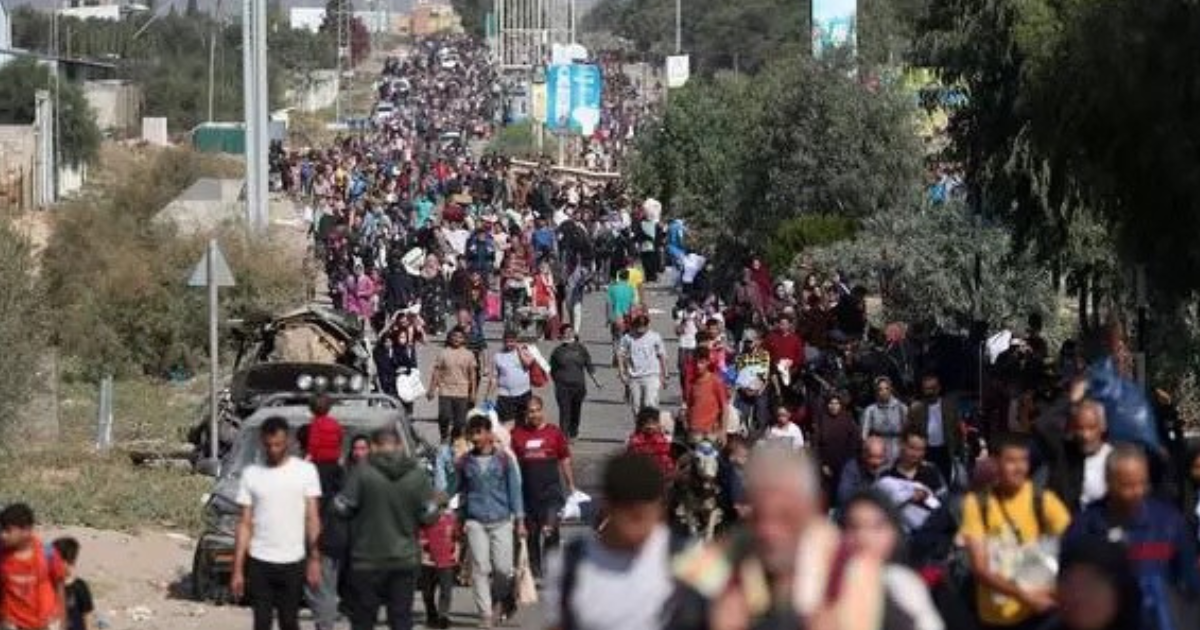As the war in Gaza stretches into its third month, the humanitarian situation in the Gaza Strip has reached an unprecedented level, as food, fuel, and the most basic supplies begin to run out. The continuous bombing has killed thousands of Palestinians. Meanwhile, the situation in the West Bank and East Jerusalem is deteriorating as settler attacks on Palestinian communities intensify.
Before the temporarily ceasefire went into effect on 24 November and with conditions growing worse by the day, Sari Harb of the Rosa Luxemburg Foundation’s Ramallah Office spoke with Palestinian human rights expert Issam Aruri about the current escalation in Gaza, the events leading up to it, and what the war means for the 2.2 million people living there.
Issam Aruri is director of  the Jerusalem Legal Aid and Human Rights Center, a partner organization of the Rosa Luxemburg Foundation’s Palestine and Jordan Office, and Commissioner General of the Independent Commission for Human Rights, the national institute of human rights in Palestine
the Jerusalem Legal Aid and Human Rights Center, a partner organization of the Rosa Luxemburg Foundation’s Palestine and Jordan Office, and Commissioner General of the Independent Commission for Human Rights, the national institute of human rights in Palestine
We have observed a significant deterioration in human rights conditions in Gaza, the West Bank, and East Jerusalem. Could you provide an overview of the current situation in the Occupied Territories?
The situation in the Occupied Territories deteriorated massively in the last three to four years. However, the peak of this deterioration — especially in the West Bank — was when the new ultra-right government formed in Israel. This government includes members who call for the “transfer of all Palestinians”. Bezalel Smotrich, Finance Minister and Minister in the Defence Ministry responsible for the Occupied Palestinian Territories, made it quite clear that his plan is to eliminate Palestinians.
Based on some statistics from the years before 2023, the average number of Palestinians killed by Israeli military forces in the West Bank annually was 40 to 50. By October 2023 alone, the number had reached 248.
This year also set an all-time record for settlement expansion. Before the war, the level of settler violence against Palestinians in the West Bank was unprecedented, and settler attacks on Palestinian civilians set a record. It became the norm for Israeli settlers to kill Palestinians without question or arrests of these settlers.
According to the Geneva Conventions, an occupying power must protect civilians. It is thus obligatory for Israel to protect Palestinian civilians. Instead, arming settlers is increasing by the day, and we can expect more deterioration in the West Bank.
You have consistently delivered updates on the human rights situation in your role at the Jerusalem Center for Human Rights. Now that we have reached more than 30 days of war, could you elaborate on the situation and discuss its impacts on your efforts?
We are currently working at 50 percent of our capacity because of the dangers our staff face while commuting, now that further restrictions on movement have been implemented. There is an Israeli checkpoint at almost every single entrance to any Palestinian area, not to mention the Israeli settler attacks on the road. Commuting is becoming very dangerous.
We also face difficulties in some types of our work. For instance, we used to provide legal aid to victims of settler violence. In order to start such work or file a case on settler violence, we would first have to bring the victim to an Israeli police station to issue a complaint. However, all Israeli police stations in the West Bank are located in the settlements. In some situations, the perpetrators who we have to file the case against happen to be in the same settlement from which they launch the attack.
That’s why, for instance, we stopped filing cases against settler violence. We sent a letter to the Israeli Civil Administration, the body with actual control of the West Bank, asking them to change the situation so that we have accessible places where we can file cases.
Added to this are the astonishing random arrests. The number of Palestinian arrested in the West Bank since the start of this war has reached over 2,000. Something as simple as writing a Facebook post about the Gaza bombardment puts one at high risk of arrest. To what extent can you express your opinion — if you are even allowed to have an opinion, or if you choose to share some information? It is becoming common for Israeli soldiers to demand people hand in their mobile phones at the checkpoints.

Displaced Palestinians make their way to the southern Gaza Strip, 9 November 2023. Photo: Mohammed Zaanoun/ActiveStills
As a human rights centre, how do you deal with the dehumanization of Palestinians during wartime?
Dehumanization of Palestinians is something structural within the Israeli system. I recall what Ayelet Shaked said as Minister of Justice, when she announced that Israeli forces should kill all pregnant Palestinian women before they give birth to “little snakes”.
Most recently, the Israeli Minister of Defence said they are fighting “human animals”. We believe that these types of statements are used to justify the mass killing of Palestinians in Gaza as well as large parts of the West Bank. Meanwhile, the mainstream media is complicit, if not promoting such statements and discourse.
That is why we called on Israel and the international community to establish a neutral investigation committee to take up all the claims. If Israel is convinced of what it promotes, why wouldn’t it allow independent bodies like the UN Human Rights Council and the independent commission of inquiry that was formed by the Human Rights Council and the International Criminal Court to investigate these cases?
What are the consequences of the current war for Gaza?
Most Western countries say that Israel has the right of self-defence without affecting civilians. Yet so far, the only ones affected in this war have been civilians.
As of 8 November, 10,022 Palestinians had been killed, including at least 4,800 children, 46 journalists, and 125 paramedics. There were 50,000 pregnant women without access to adequate clinics. The World Health Organization and UN agencies reported that 14 out of 35 hospitals in Gaza and 46 out of 72 health centres were either destroyed or no longer functioning. UN shelters are being bombed, including three schools — two of which belong to the United Nations.
Is this self-defence? We do not know how many Palestinian victims are needed for Israel to say it’s enough.
In international humanitarian law, there are three fundamental principles that all parties involved in any conflict must uphold.
Firstly, there is the principle of discrimination, which mandates that attacks should be carried out with a clear distinction between combatants and non-combatants. Regrettably, in the ongoing conflict, we see a complete absence of discrimination, as entire buildings are indiscriminately targeted, placing civilians in grave danger.
The second principle is proportionality, which requires that the force used in any military action should be commensurate with the intended military objective. Tragically, we are witnessing a disregard for this principle as well.
The third principle, military necessity, calls for the use of force only when deemed necessary for legitimate military objectives. Sadly, these principles are consistently being violated, leading to concerns about the excessive use of force.
In my view, Israel has exceeded the bounds of self-defence. Major international reports have alleged that Israel’s actions not only constitute war crimes, but also approach the threshold of genocide. This is particularly troubling, as collective punishment is being employed to influence and compel people to evacuate the area in which they reside. The consequences are dire, with 1.5 out of 2.2 million — two-thirds of the population — now displaced.
What is needed now from a humanitarian perspective?
Time is running out and the situation is beyond catastrophic. An immediate ceasefire is required. Opening effective humanitarian relief corridors is imperative, especially now that winter is arriving, and it is essential to provide suitable and adequate shelter. Most importantly, it is vital to pave the way for a political process that deals with the root causes of the crisis.








